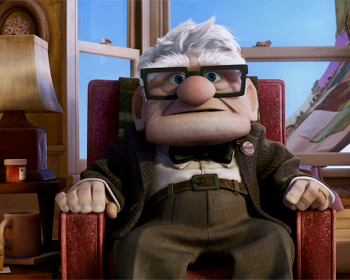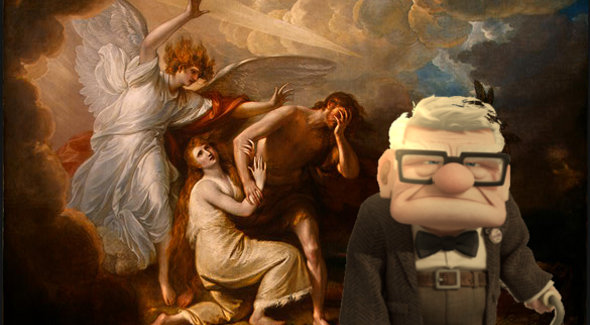What now?

Amazingly, more effed up than it looks.
You ever wonder why so many superhero movies are origin stories, or why so many good superhero origin story movies have awful sequels? You ever wonder why Labyrinth is so much more interesting than Fraggle Rock, despite sharing many superficial similarities?
Well, there are a lot of reasons for that last one (the relationship between Doozers and Fraggles is the creepiest thing I came across as a child, bar none), but growing-up stories are relatively easy to do well. They lean toward being insightful, funny, motivating, compassionate and inspiring.
There’s a natural narrative to it — a beginning, a middle and an end. There are changes, important choices, irony, setbacks, triumph, discovery, despair, sex, violence, conflict and even happy endings. Growing up brings with it all the elements of marketable drama.
Why do Can’t Hardly Wait or Fast Times at Ridgemont High end with those “This is what happens afterward” subtitles? If this information is important to the story, why do they tell us and not show us?
Well, what would be the point? Even if it’s important, why would you want to watch it?
Growing up stories (I love to use that word Bildungsroman for them) have points. Growing up itself has a point. Puberty has a point (as about 48% of Americans have found out awkwardly in math class). It’s never acceptable or desirable — or even really possible, provided you remain in decent health — to fail to transition from a child to an adult during a certain point in your life, whatever that means to you. It is a goal set for you, not something you must decide to do yourself.
Upon entering adulthood in earnest, perhaps after a brief respite, it is easy to become obsessed with the growing up of others — to dedicate yourself to helping others grow up, to live vicariously through others growing up, to lose your adult self in children and teenagers, to watch Gossip Girl.
This is also why so many good songs are written about drug addiction. Drug addiction has a point; you want/need more drugs. If you’re not addicted to drugs, that’s its own good news. But there’s also some bad news:

Watching Matlock can be the point of your life, but it's always optional.
Because — and I hate to break it to you — after you grow up, barring kids, your life doesn’t really have a point anymore.
Not an inherent one anyway — not one that is manifest in great physical and emotional urgency. Not one that informs everything you do and every thought you have. Not one that brings its own screenwriting team. Your life’s easiest path to a readily narritivizable purpose is not to be walked by your feet, but by those of someone smaller.
This is not to say adult life has no meaning without children. Just that, if you don’t have kids, or after they grow up, the subjective adult life doesn’t come with a point that is obvious, consonant and mandatory, as much intrinsic as extrinsic, and as much provided to the one experiencing it as by it.
Nope, after you grow up, after you learn what you need to learn to be an adult, after you’ve gone through your sundry rites of passage and come to terms with the world, after you’ve beaten Valley, pranked the dean, succeeded in business without really trying and revealed your true gender to your best guy friend in the back room by pulling apart your ill-fitting man clothes and lambasting him with your late-night-cable femininity, there’s a block of time you get to use doing pretty much whatever you want before you die.

He knows a little something about pointlessness.
It tends to be pretty open-ended. It probably won’t have much of a plot unless you force it. Few people are going to want to make a movie about that when they can just tell the story of another teenager (or somebody somewhat older playing a teenager and doing all the same stuff, like Luke Perry in 90210 or Charlie Sheen in Two and a Half Men — prepare to have your mind blown: the half-man isn’t the chubby kid, it’s Charlie the Man-child).
I should clarify, this is no reason to be depressed. There is a lot to be said about the Good Life, and that it would make a Good Movie is perhaps not one of those things.
Still, especially for people hooked on narrative, the existential burden of not having a point in your life can be crushing, and the philosophical implications of it boggle the mind. The challenge it poses – not just to bemoan it, but to add something to supplant what is missing (other than heroin) – lead to our greatest and most difficult works of art. Here I am talking about the intrinsic pointlessness of adult life again, and looking to art in the source for meaning. Two and a Half Men isn’t that good.
After the voice cracks and the first kisses, after the thrown mortarboards and the sitting at the feet of the mentor and defeating David Bowie in a psychedelic stairway-off, there remains this paralyzing, paralyzing question.
It’s the question that Paradise Lost brings us to, and the question Carl Fredriksen confronts close to the beginning of Up. (my words, not words from the movie)
“What now?”
As the Ferrett pointed out in his great guest article, when Russell and Fredriksen set foot in South America, it is no forest primeval — Paradise Falls spills from a broad rock face, haunted by history and teeming with ravenous dogs.

Bravo.
What more can I say?
Overthinkinit.com: Pop Cultures answer to Rinzai Zen.
@Michael Williams
One thing I have always kind of exasperatedly yelled at people (which is probably why they don’t listen) is that you don’t have to get all orientalist for this kind of thinking. There are rich traditions of this sort in all cultures – there is nothing new under the sun.
I think that defying the notion that the people and culture who do cool things are people and cultures other than you and yours is one of my major motivations in writing for Overthinking It.
Well, that and the ladies. I do it for the ladies.
Yes of course. You need not go Said on me.
However, the severity of analysis does from time to time border on the Koan-like imho.
Tit for tat aside.
Who’s leg do you have to hump to get some McLuhan fused analysis around here?
I have yet to see Up myself, but just one viewing of the trailer was enough to solidify my opinion that whatever sandbox Pixar decides to play in, the end result will invariably touch upon that deep part of the human condition that, as you said, only art is able to express (or reflect). It’s funny how a metaphor- by definition an indirect representation of something else- is often the most effective means of conveying truth. Thank you for writing this, Fenzel. I now have something more to ponder on my way out of the theater when I finally have the time to see this masterpiece.
And there are still piles of snob critics out there who don’t believe anything with the name Disney (even adding Pixar) on it can be any good, or contain any serious ideas. This should start to show them.
Best final fantasy reference ever?
Up was incredible. Your analysis has some great stuff, particularly about epistemology stunting discourse, and art being a language unto itself. I completely agree, but your conclusion feels like a cop-out. If we are to subside and let the art speak for itself, then why bother writing to begin with – only to say ‘look out for these themes and see it for yourself’? I believe ideas have to be realized for each person, that the infectiousness of a truth is not contingent solely on just how much sense it makes. And so I agree that a person ought to experience a work of art in his or her own time and feel what truth is appropriate to his or her biography and present.
So why write? Personally, I write because I feel that art is being mistreated, that the masses’ approach to art is inappropriate to the art (although much art is being adapted for appropriateness to the common approach). If you have a feeling or idea, a response to Up, treat it purely. Your subjective response is in itself its own work of art, and I can learn from it. I feel as though you’re holding back.
I’m being very nitpicky though. Your thoughts are a pleasure to read, and you’ve made me want to read Paradise Lost. I’m ignorant to Milton’s work, so because of this, I at least now have interest. Thanks for the stimulating read, this strikes me as being unlike any other place writing about movies, and I think you’ve got a reader in me now.
I know nothing about Milton’s Paradise, but I found this review to be one of the most insightful ones online about Pixar’s UP. And I should know, because I scoured the web for information on UP in order to prepare for writing my own review. You can read it here.
The Spirit of Pixar’s UP
I decided to copy your style by including quotes in my review from a classic work, but in my case it is “Romeo and Juliet”. I elaborated on your Adam and Eve theme and suggested that this is A&E in reverse. Where the protagonist is heading toward the Garden of Eden instead of being thrown out of it. I also compared the story to Don Quixote and the Wizard of Oz.
I hope you get a chance to read my review and comment on it.
Yes. Best Final Fantasy reference,… well not ever but in a damn long while. I actually had to cover my mouth to quiet the horrible giggling that friggin’ picture caption got out of me, for fear of waking up other people in my house.